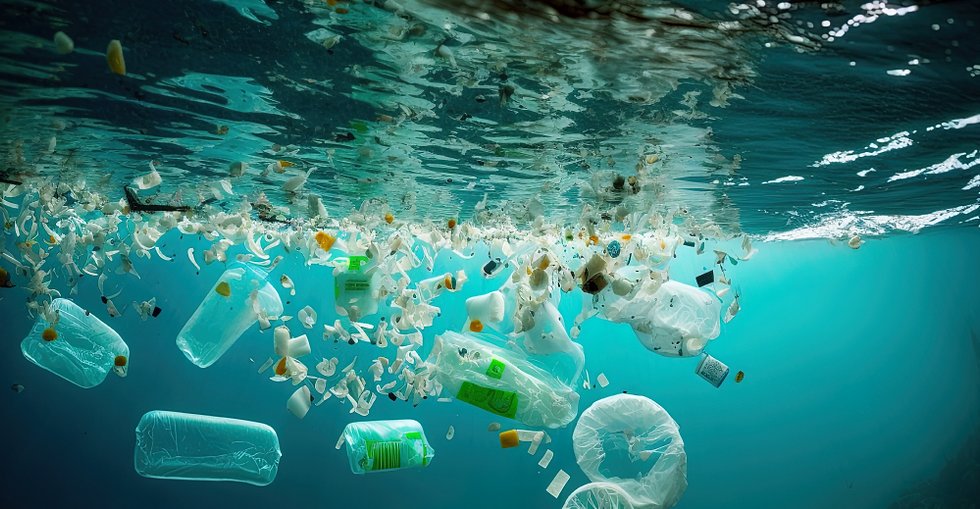
Genetically-engineered bacteria break down plastic in saltwater
12/12/24, 12:22
Last updated:
Published:
29/09/23, 20:19
Unlocking the potential to tackle plastic pollution in oceans
Groundbreaking discovery in the fight against plastic pollution
North Carolina State University researchers have made a groundbreaking discovery in the fight against plastic pollution in marine environments. They have successfully genetically engineered a marine microorganism capable of breaking down polyethylene terephthalate (PET), a commonly used plastic found in water bottles and clothing, contributing to the growing problem of ocean microplastic pollution.
Introducing foreign enzymes to V. natriegens
The modified organism, created by incorporating genes from the bacterium Ideonella sakaiensis into the genome of Vibrio natriegens, can effectively degrade PET in saltwater conditions. This achievement marks the first time foreign enzymes have been successfully expressed on the surface of V. natriegens cells, making it a significant scientific breakthrough.
PET microplastics pose a significant challenge in marine ecosystems, and current methods of removing them, such as extracting and disposing of them in landfills, are not sustainable. The researchers behind this study aim to find a more environmentally friendly solution by breaking down PET into reusable products, like thermoformed packaging (takeaway cartons) or textiles (clothing, duvets, pillows, carpeting).
The team worked with two bacteria species, V. natriegens and I. sakaiensis. V. natriegens, known for its rapid reproduction in saltwater, served as the host organism, while I. sakaiensis provided the enzymes necessary for PET degradation. The researchers first rinsed the plastics collected from the ocean to remove high-concentration salts before initiating the plastic degradation process.
Challenges ahead
While this breakthrough is a significant step forward, three key challenges are still ahead. The researchers aim to incorporate the DNA responsible for enzyme production directly into the genome of V. natriegens to enhance stability.
Because DNA is the genetic material responsible for the production of enzymes, and enzymes are proteins that are responsible for carrying out various chemical reactions in the body, by incorporating the DNA responsible for enzyme production into the genome of V. natriegens, the researchers can enhance the stability of the enzyme production. Thus, this DNA is essential for producing the enzymes necessary for PET degradation, as it contains the genetic information vital for encoding the proteins needed for PET breakdown.
Additionally, the research team plans to modify V. natriegens further to feed on the byproducts generated during PET degradation. Lastly, they seek to engineer V. natriegens to produce a desirable end product from PET, such as a molecule that can be utilised in the chemical industry.
Collaboration with industry groups
Collaboration with industry groups is also crucial in determining the market demand for the molecules that V. natriegens can produce. The researchers are open to working with industry partners to explore the vast production scale and identify the most desirable molecules for commercial use.
By introducing the genes responsible for PET degradation into V. natriegens using a plasmid, the researchers successfully induced the production of enzymes on the surface of the bacterial cells. The modified V. natriegens demonstrated its ability to break down PET microplastics in saltwater, providing a practical and economically feasible solution for addressing plastic pollution in marine environments.
This research represents a significant advancement in the field, as it is the first time that V. natriegens has been genetically engineered to express foreign enzymes on its cell surface. This breakthrough opens up possibilities for further modifications, such as incorporating the DNA from I. sakaiensis directly into the genome of V. natriegens to make the production of plastic-degrading enzymes a more stable feature of the organism.
The researchers aim to modify V. natriegens to feed on the byproducts produced during the breakdown of PET and create a desirable end product for the chemical industry. The researchers are open to collaborating with industry groups to identify the most desirable molecules to be engineered into V. natriegens for production.
This groundbreaking research, published in the AIChE Journal with the support of the National Science Foundation under grant 2029327, paves the way for developing more efficient and sustainable methods for addressing plastic pollution in saltwater environments.
Conclusion
The research has made a breakthrough in the fight against plastic pollution in marine environments. By incorporating genes from the bacterium I. sakaiensis into the genome of V. natriegens, they created a genetically modified marine microorganism capable of breaking down PET. This achievement provides a practical and economically feasible solution to address plastic pollution in aquatic ecosystems. The researchers are now looking into further modifications to the organism to enable it to feed on byproducts and to produce a desirable end product that can be used in the chemical industry. This research highlights the potential of genetic engineering to create sustainable solutions to the growing problem of plastic pollution.
Written by Sara Maria Majernikova
Related article: Plastics and their environmental impact
Project Gallery


